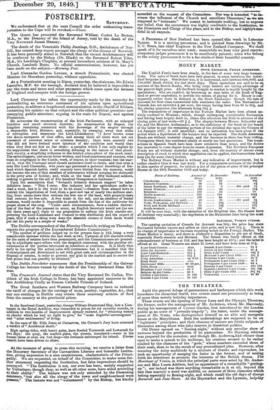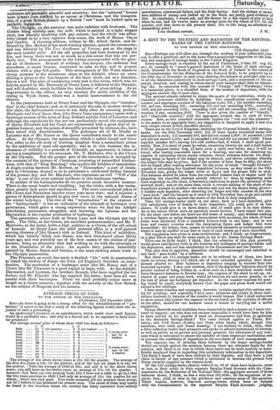THE THEATRES.
Amid the general deluge of pantomimes and burlesques which this week inundates the theatrical world, two events stand out prominently as being of more than merely holyday importance.
These events are the opening of Drury Lane and the Olympic Theatres; the former, under the management of Mr. Anderson, whom Mr. Macready, during his management of Covent Garden, first introduced to the London public as an actor of "juvenile tragedy "; the latter, under the manage- ment of Mr. Watts, who distinguished himself as an able and energetics lessee at the Marylebone. Both the undertakings are supposed to be on " legitimate " principles; and their chances of success are fertile subjects of discussion among those who take interest in theatrical politica. Old. Drury opened on " Boxing-night," without any peculiar show of newness beyond the production of its pantomime. No rhyming address was prepared for the occasion; and though Mr. Anderson.had oftener than once to make a speech to his audience, his orations seemed to be rather elicited by the clamours of the "gods," whose numbers exceeded those of their seats, than to be the result of any premeditated plan. However, after amusing the noisy multitude by a mixture of thanks and reproaohes, he took an opportunity of merging the latter in the former, and of setting forth his intentions to promote the interests of the British drama. The Merchant of Venice, in which the principal parts were acted by Mr. Ander- son and Miss Laura Addison, had no appearance of a remarkable " getting. up "; nor indeed was there anything remarkable in it at all, beyond the fact that scarcely a word was audible, on account of those clamours which belong especially to Boxing-night, and which recall the old days of George Barnwell and Jane Shore. At the Haymarket and the Lyceum, holyday
audiences are generally peaceful and attentive; but the "national " houses haye always been marked by an uproar at Christmas, and the inaugura- tion of a great British theatre by a British " row" must be looked upon as perfeitly legitinude.
. The Olympics, on the contrary, was quite redolent with freshness. The theatre being entirely new, the sale, which is painted in a light elegant style, was literally sparkling with gay colours; and the whole was effect- ively eloSed in by. a very superior drop-scene, the work of Messrs. Dayes and Gordon. A rhyming address, written by Mr. Albert Smith, and de- livered by Mrs. Mowatt in her most winning manner, opened the ceremonies; and was followed by The Two Gentlemen of Verona, put on the stage in the most tastefid style. All the old properties had been destroyed by the fire, and hence there was not so much as a side-scene that was not per- fectly new. The arrangements in the lobbies corresponded with the gene- ral air of freshness. Instead of ordinary box-keepers, the audience had attendants in smart liveries, warranted to take no fees, and to present visiters with a play-bill gratis. This arrangement of Mr. Watts stands in strong contrast to the monstrous abuse at the Adelphi, where an extra shilling is given to the box-keepers of the front circle, not as a donation, but as a toll. The plan of numbering every seat in the boxes, which was, we believe, started by Mr. Macready at Drury Lane, is followed at the Olympic, and will doubtless much facilitate the machinery of place-taking. As an improvement to the edifice. we may mention the entire abolition of the railing in Wych Street, which was a tearful inconvenience in the old theatre.
In the pantomimes both at Drury Lane and the Olympic, the " introduc- tion" is the chief feature; and, as is commonly the case in modern works of this class, the harlequinade comes in but flatly after its amusing preface; Harlequin and Good Queen Bess, (the Drury Lane pantomime,) opens with a burlesque version of the loves of Amy Robsart and the Earl of Leicester; and although the expedients for fun are not particularly novel, the equipments of Queen Elizabeth and her Court are represented with a great deal of in- genious humour, and the points of absurdity presented by costume, &c., have been seized with discrimination. The grotesque art of M. Devlin as Leicester and of Mr. Romer as the Queen contributes much to the comic effect. At the Olympic, the pantomime, which is called Laugh and Grow Fat, refers to the old story of eliciting laughter from a melancholy prince by the exhibition of some odd spectacle; and as in this instance the in- strument of risibility is a portrait of Grimaldi, an opportunity is taken of paying a compliment to his successor, Mr. T. Mathews, who is the Clown at the Olympic. But the greater part of the introduction is occupied by the contents of the picture of Christmas, consisting of personified kitchen- ware, with that of " King Humbug," who typifies the bubbles of speculation. A single combat between Mr. Herbert, as " Nutcracker," a sort of lieute- nant to Christmas, dressed so as to caricature a celebrated barn General of the present day, and Mr. Marshall, who represents an evil " Will o' the wisp," is one of the most comical incidents in this burlesque warfare.
In neither of the harlequinades do we perceive much inventive humour. There is the usual bustle and tumbling; but the tricks, with a few excep- tions, greatly lack point and significance. The mere conventional jokes of thi Clown and Pantaloon become every year more trite; and it requires a genius of Aristophanic mould to give new verve to the national drama of the winter holydays. The rise of the " introduction at the expense of the " harlequinade " is but an indication of the triumph of burlesque over pantomime, which gains a strong expression when we find the Adelphi abandoning pantomime altogether, and imitating the Lyceum and the Haymarket in the regular production of burlesques.
The pantomime actors both at Drury Lane and the Olympic are very good. The Stilts, at the former, are excellent posturemasters; and Mr. T. Matthews, at the latter, holds a high position as a Clown of the old school of humour. At Drury Lane the chief pictorial effect is a well-painted moving diorama of the Queen's visit to Ireland. This kind of exhibition, which has latterly fallen into disuse, was first introduced about thirty years ago, and was probably one of the first causes of the decline of pan- tomime, Laing an attraction that had nothing to do with the structure or in the illustration of the piece. An aquatic fairy palace, beautifully painted by Messrs. Dayes and Gordon, is the most striking scenic work in the Olympic pantomime.
The Princess's, as usual, has made a decided " hit " with its pantomime; to which the history of James the First (of England) furnishes an intro- duction. The possession of a burlesque actor like Mr. Honey and of a Clown like Mr. Flexmore is a good capital to begin with. At the Adelphi, Haymarket, and Lyceum, the brothers Brough, who have supplied the two former, and Mr. Planchd, who has supplied the latter, have been all suc- cessful with their burlesques. These we shall probably notice more at length on a future occasion; together with the novelty at the New Strand, on the subject of Diogenes and his lantern.



























 Previous page
Previous page